#very folkloric
Explore tagged Tumblr posts
Note
(about the latest drabble): I'm sorry, Welsknight's code of honor says what
Gotta love Chivalry!
Welsknight in RnS is trying is ready best to be a good knight, but he has no church to swear fealty to [unless he builds one himself] and no Knightly Order to train and be ordained with [unless he builds one himself] so unlike Helsknight, who sought out a church in hels and got knighted the Ye Olde Fashioned Way, Welsknight follows the rules of Poetic Chivalry. The more he and Helsknight have fought it out, the more Helsknight's tenets have been incorporated into Welsknight's idea of Chivalry [and Helsknight's tenets themselves are based on Chivalric Laws anyway] but still, their personal creeds are a little to the left of each other.
With that little rant out of the way, the Chivalric Laws I'm using for Welsknight are augmented from Léon Gautier's Ten Commandments of Chivalry:
Thou shalt believe all that the Church teaches and thou shalt observe all its directions.
Thou shalt defend the Church.
Thou shalt respect all weaknesses, and shalt constitute thyself the defender of them.
Thou shalt love the country in which thou wast born.
Thou shalt not recoil before thine enemy.
Thou shalt make war against the infidel without cessation and without mercy.
Thou shalt perform scrupulously thy feudal duties, if they be not contrary to the laws of God.
Thou shalt never lie, and shalt remain faithful to thy pledged word.
Thou shalt be generous, and give largesse to everyone.
Thou shalt be everywhere and always the champion of the Right and the Good against Injustice and Evil.
For the sake of RnS, which has vague gods and saints in hels, but only the gods and saints players make everywhere else, for Welsknight, all tenets about God and Church are Hermitcraft the Server and what it represents. The laws and teachings of Hermitcraft are its pledges to creativity and fairness and prosperity. He will defend it to his dying breath, because it's his home, and the living, breathing part of the universe that he and his friends create in. And any enemy of Hermitcraft is his personal enemy as well.
[I like to imagine the reason Welsknight didn't get involved in the HC x Empires crossover was because he was busy making sure the Empires crew wouldn't start a war he personally had to finish lol]
He really is trying his best.
The problem with Chivalry though, is it is inherently about crusades. Chivalric poems, while filled with a good bit of manner and courtly love, are also filled with the ideas of self sacrifice for a ruthless Good, a Good that roots out evil, with tragic grace. A Good that, ultimately, crusaded against whole countries, because Good wouldn't abide by Evil. Chivalry needs something to fight for. Otherwise it's just a basket of nice, convenient morals, a horse and a suit of armor. So you can imagine, in his own subtle, misguided way, Welsknight is actually quite happy hels exists. What good is a knight without something to fight for? Or better yet, to fight against, because it is very convenient to define yourself by everything your enemy isn't.
And his enemy isn't kind to him. His enemy must be a liar, because what he says about his worthiness as a knight can't be true. And his enemy must be cruel, because he seeks him out to hurt him. And his enemy must be relentless, because he hasn't given up yet. And his enemy is Helsknight, and everything Helsknight stands for, and apparently, Helsknight stands for quite a lot, including other people, and other people can be fought.
(He and Helsknight, despite every kick and scream to the contrary, really are a lot alike.)
#answering asks#anonymous#redstone and skulk#welsknight#helsknight#chivalryyyyyy#gotta love chivalryyyyyyy#the first time i read an arthurian novel i remember thinking it was a bit cruel#the way the characters are punished for things they couldnt know because they were chivalric missteps was always interesting#very folkloric#rns asks
111 notes
·
View notes
Note
please help me- i used to be pretty smart but i’m having so much trouble grasping the concept of diegetic vs non-diegetic bdsm!
gfkjldghfd okay first of all I'm sorry for the confusion, if you're not finding anything on the phrase it's because I made it up and absolutely nobody but me ever uses it, but I haven't found a better way to express what I'm trying to say so I keep using it. but now you've given me an excuse to ramble on about some shit that is only relevant to me and my deeply inefficient way of talking and by god I'm going to take it.

SO. the way diegetic and non-diegetic are normally used is to talk about music and sound design in movies/tv shows. in case you aren't familiar with that concept, here's a rundown:
diegetic sound is sound that happens within the world of the movie/show and can be acknowledged by the characters, like a song playing on the stereo during a driving scene, or sung on stage in Phantom of the Opera. it's also most other sounds that happen in a movie, like the sounds of traffic in a city scene, or a thunderclap, or a marching band passing by. or one of the three stock horse sounds they use in every movie with a horse in it even though horses don't really vocalize much in real life, but that's beside the point, the horse is supposed to be actually making that noise within the movie's world and the characters can hear it whinnying.
non-diegetic sound is any sound that doesn't exist in the world of the movie/show and can't be perceived by the characters. this includes things like laugh tracks and most soundtrack music. when Duel of Fates plays in Star Wars during the lightsaber fight for dramatic effect, that's non-diegetic. it exists to the audience, but the characters don't know their fight is being backed by sick ass music and, sadly, can't hear it.
the lines can get blurry between the two, you've probably seen the film trope where the clearly non-diegetic music in the title sequence fades out to the same music, now diegetic and playing from the character's car stereo. and then there are things like Phantom of the Opera as mentioned above, where the soundtrack is also part of the plot, but Phantom of the Opera does also have segments of non-diegetic music: the Phantom probably does not have an entire orchestra and some guy with an electric guitar hiding down in his sewer just waiting for someone to break into song, but both of those show up in the songs they sing down there.
now, on to how I apply this to bdsm in fiction.
if I'm referring to diegetic bdsm what I mean is that the bdsm is acknowledged for what it is in-world. the characters themselves are roleplaying whatever scenarios their scenes involve and are operating with knowledge of real life rules/safety practices. if there's cnc depicted, it will be apparent at some point, usually right away, that both characters actually are fully consenting and it's all just a planned scene, and you'll often see on-screen negotiation and aftercare, and elements of the story may involve the kink community wherever the characters are. Love and Leashes is a great example of this, 50 Shades and Bonding are terrible examples of this, but they all feature characters that know they're doing bdsm and are intentional about it.
if I'm talking about non-diegetic bdsm, I'm referring to a story that portrays certain kinks without the direct acknowledgement that the characters are doing bdsm. this would be something like Captive Prince, or Phantom of the Opera again, or the vast majority of bodice ripper type stories where an innocent woman is kidnapped by a pirate king or something and totally doesn't want to be ravished but then it turns out he's so cool and sexy and good at ravishing that she decides she's into it and becomes his pirate consort or whatever it is that happens at the end of those books. the characters don't know they're playing out a cnc or D/s fantasy, and in-universe it's often straight up noncon or dubcon rather than cnc at all. the thing about entirely non-diegetic bdsm is that it's almost always Problematic™ in some way if you're not willing to meet the story where it's at, but as long as you're not judging it by the standards of diegetic bdsm, it's just providing the reader the same thing that a partner in a scene would: the illusion of whatever risk or taboo floats your boat, sometimes to extremes that can't be replicated in real life due to safety, practicality, physics, the law, vampires not being real, etc. it's consensual by default because it's already pretend; the characters are vehicles for the story and not actually people who can be hurt, and the reader chose to pick up the book and is aware that nothing in it is real, so it's all good.
this difference is where people tend to get hung up in the discourse, from what I've observed. which is why I started using this phrasing, because I think it's very crucial to be able to differentiate which one you're talking about if you try to have a conversation with someone about the portrayal of bdsm in media. it would also, frankly, be useful for tagging, because sometimes when you're in the mood for non-diegetic bodice ripper shit you'd call the police over in real life, it can get really annoying to read paragraphs of negotiation and check-ins that break the illusion of the scene and so on, and the opposite can be jarring too.
it's very possible to blur these together the same way Phantom of the Opera blurs its diegetic and non-diegetic music as well. this leaves you even more open to being misunderstood by people reading in bad faith, but it can also be really fun to play with. @not-poignant writes fantastic fanfic, novels, and original serials on ao3 that pull this off really well, if you're okay with some dark shit in your fiction I would highly recommend their work. some of it does get really fucking dark in places though, just like. be advised. read the tags and all that.
but yeah, spontaneous writer plug aside, that's what I mean.
#I found their original stuff while I was researching various waterhorses and their folklore for no reason#because one of the characters in their original work happens to be an each uisge#and then it turned out it ALSO included a lot of figures from welsh folklore in general#so yknow if you happen to have my incredibly specific hyperfixations you'll love it but even if you don't it's great#I didn't mean to bring up phantom of the opera so much it just happens to be very relevant to a lot of my talking points#I haven't actually seen it in years
19K notes
·
View notes
Text
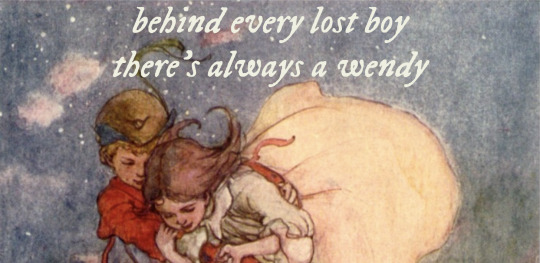
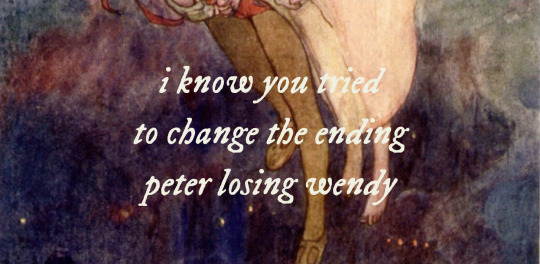
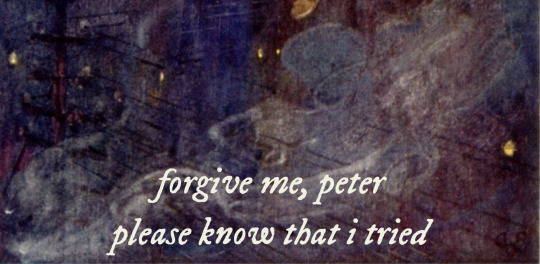
Illustration from The Adventures of Peter Pan – Alice Bolingbroke Woodward // Wendy – Maisie Peters // cardigan – Taylor Swift // Peter – Taylor Swift
#i feel very normal about these parallels 😀👍#peter pan#wendy darling#alice woodward#wendy#wendy song#wendy maisie peters#the good witch#the good witch album#the good witch maisie peters#tgw#maisie peters#cardigan#cardigan song#cardigan taylor swift#folklore#folklore album#folklore taylor swift#peter#peter song#peter taylor swift#the tortured poets department#ttpd#taylor swift#art history#art#lyrics#lyric art
1K notes
·
View notes
Text
Some of the art I've done for folklore from my homeland of Asturias:
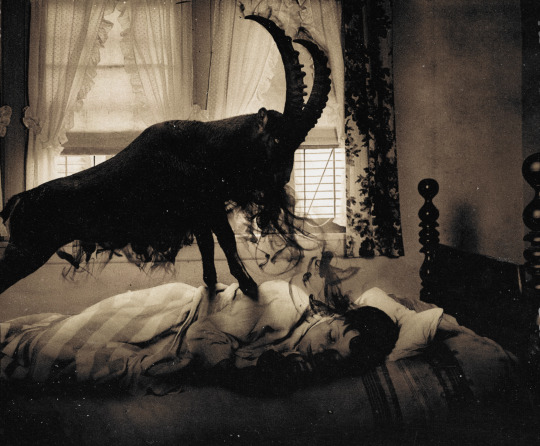
El Pesadiellu haunts people in their sleep. It will stand atop you, pressing down on your chest to cause suffocation and nightmares. As soon as you wake, it will vanish.
It takes many forms, from a huge hairy hand (la Manona), to a male goat, to a purely invisible being. All across Asturias, it is believed to be the cause of many of the horrors that affect us in our slumber.

In the forests of Asturias, people know to beware of the scraping sound of washboards near streams. It means the Llavanderes are working.
One of the washerwomen will ask for help drying her blood-soaked shroud. Never twist it in the same direction as her, or she will drown you.
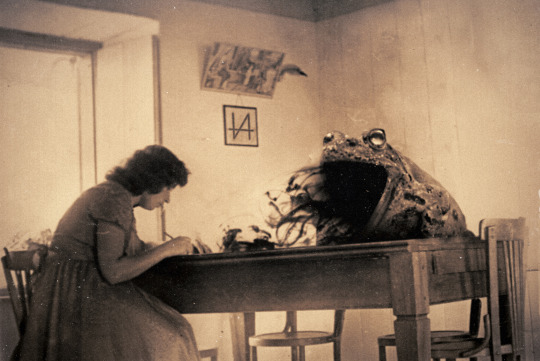
El Sumiciu is an entity that embodies the void. When someone loses an object that seemed to be in front of them moments ago, they will usually accuse the greedy Sumiciu of swallowing it. Oft misconceived as a house elf, its true shape is shrouded in mystery.
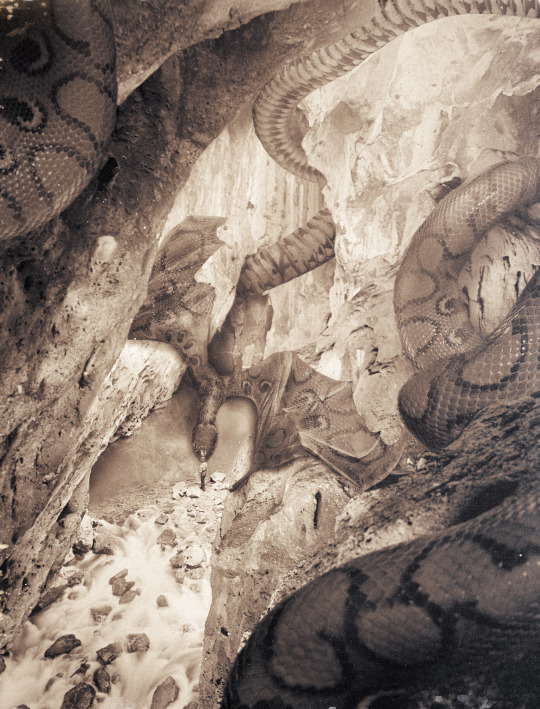
When travelling the craggy mountains of Asturias, beware the hiss of the Cuélebre, a winged serpent which grows over the aeons until the earth trembles under its weight.
If you are foolish enough to seek its treasure, find its cave on the Summer Solstice, when it is weakest. You must bring an offering it may feed on, and hide inside it knives and needles that will slay it from within.
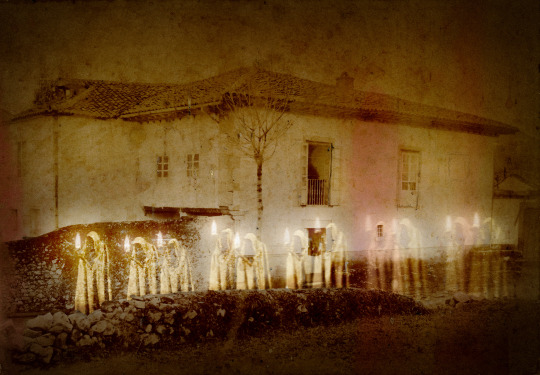
This picture was taken the night when two kids passed away from tuberculosis in a small Asturian village, 1892.
In these remote areas people still tell the tales of La Güestia, a ghostly procession that will march towards a dying person's house and carry them off to join them.
#My folklore pieces are never very popular but it always makes me happy to represent the creatures I grew up with!#Hope you like em!#Folklore#Photoshop#Asturias
1K notes
·
View notes
Text

Bet you didn’t think you’d learn what human and 100% troll Fass looked like today, did you? Or what his parents looked like. Or what he looked like as a human kid. Nope, betchu didn’t.
But anyway. A bunch of miscellaneous troll/changeling information just because. Also trolls are born as beans like bears. Just so everyone knows. Female trolls are called sows and males are called bores. That’s all.
#idk why#but I just really love how his mom looks#she’s very crunchy#fae#faerie art#troll character design#troll changeling#nordic folklore#folklore#character design#artists on tumblr#small artist#my art#young artist#digital art#regular style#changeling#faas art#tgb art#tgb#the grey in between#creature design#fae art#speculative biology#spec bio
328 notes
·
View notes
Text

A Scent of Jasmine
#THE MOST FEARSOME DEMONIC LADY FOLKLORE IN INDONESIA (and probably other asian countries as well!!!)#kuntilanak#myart#i love her lores#but also very terrified of her#if you smell jasmine she’s close to you#she likes to giggle too
441 notes
·
View notes
Text

A poster I did for "Heroic epics of the peoples of Russia" project by Nikolay Rastorguev Foundation and the Moscow's Department of Culture
Rus Byliny (plural) — oral epic poems in Kyivan and Novgorod Rus, counting more than 400 poems and mostly focusing on the semi-historic deeds of bogatyrs ("great warrior"). Despite common traits, they show a variety of themes, structure and dates of origin. The centerpiece is the most famous bogatyr trio — Ilya of Murom, Dobrynya Nikitich and Alyosha Popovitch with their respective antagonists, while the foreground focuses on much more archaic heroes — Svyatogor and Mikula Selyaninovitch. Heroes of that period inhabit almost a mythological world, and often posses chthonic traits themselves. Even by the time of the Boratyr Trio their stories centered on no longer belonging to the "modern" world.
Twitter | VK | INPRNT | Leave a tip
#artists on tumblr#slavic#folklore#kyivan rus#rus#novgorod rus#mythology#inkyami researches#most of those characters are in my slavic deck (I had a VERY one-themed autumn)#some I even posted here
368 notes
·
View notes
Text
Nintendo Tears of the Kingdom Gameplay Demonstration: there are new enemies called constructs me, a tired Jew after hearing every fucking Zeldatuber call them golems for the past year: FUCK YES THANK YOU NINTENDO
#totk#totk spoilers#tears of the kingdom#tears of the kingdom spoilers#golems are a VERY SPECIFIC THING#not just oh it's made of rock looking shit so it's a golem you insensitive gamers#it's a JEWISH FOLKLORE CREATURE#anyway i am very pleased#and very excited for the game#i wish they'd shown how combat works in the air tho i would like to know if i am capable of playing the entire game
2K notes
·
View notes
Text
Guarding your name from the fae in folklore
The idea of fae stealing names is quite recent (I’m a big fan of new, modern folklore, x, y), but the idea that you have to guard your name so no one could (supernaturally) us it against you, is definitely a widespread folk belief. However, I’ve never encountered an actual folktale that says the fae or fairies in particular could have power over you if they knew your name. I’ve been looking for one for a long time (and if you know one please let me know!) but so far I’ve only come up with one example. So let's take a look:
The power of names
Like I said, the power of names is an old belief that shows up all over the world. Sometimes it’s linked with naming ceremonies like baptism. Sometimes hiding the name from others (witches, djinns, etc.) is what will protect you, sometimes the name itself will protect you (like being named after a saint or in reverence of a deity or spirit). Edward Clodd published a huge essay in 1898 investigating how widespread this name guarding practice is and how it links to folklore. Which, while obvioulsy dated, certainly gives an impression of how deep this belief goes (Tom Tit Tot; an essay on savage philosophy in folk-tale, Clodd, E., 1898).
Not all folk beliefs show up in folktales though and protagonists who refuse to tell their name are not a staple of European folklore, whether it concerns fae or other entities. In “The Soul Cages”, collected by T. Crofton Croker it’s even quite the opposite, as the protagonist and a firendly merrow deliberately call each other by their full names (Jack Dogherty and Coomara). And for ages I wasn't able to find a story that actually incorporated the belief of guarding your name against fae, until I read that huge essay.
Hiding your name from the fairies
In his book, Clodd mentions a single folktale in which it is mentioned that the fae are trying to learn someone’s real name. Sadly he does not tell it in full, but since it is the only real example of this concept I’ve able to find so far, I will give the full quote:
While these sheets are passing through the press, my friend Mr. W. B. Yeats hands me a letter from an Irish correspondent, who tells of a fairyhaunted old woman living in King's County. Her tormentors, whom she calls the "Fairy Band of Shinrone," come from Tipperary. They pelt her with invisible missiles, hurl abuse at her, and rail against her family, both the dead and the living, until she is driven well-nigh mad. And all this spite is manifested because they cannot find out her name, for if they could learn that, she would be in their power. Sometimes sarcasm or chaff is employed, and a nickname is given her to entrap her into telling her real name, — all which she freely talks about, often with fits of laughter. But the fairies trouble her most at night, coming in through the wall over her bed-head, which is no laughing matter; and then, being a good Protestant, she recites chapters and verses from the Bible to charm them away. And although she has been thus plagued for years, she still holds her own against the "band of Shinrone." (Clodd, 1889, p. 83-84).
This story fits the concept of keeping your name away from malicious fairies so you cannot truly fall under their power perfectly. Sadly I haven’t been able to find this story in Yeats’ own folklore collection, but it fulfills my criteria even so.
What I have been able to find many examples of, however, is the reverse trope. Namely that knowing a fairy’s name will give you power over them. I thought this only showed up in Rumplestiltskin-type stories, but it seems a little more widespread than that. Which is very exciting to me, and merits its own post. So stay tuned.
#guard your name#fae#faeries#fairies#sources#laura babbles#folklore#irish folklore#I'm very pleased to have finally found a real example#although it seems a firsthand witness account#which is a more unusual way for this type of folklore to present itself#but no less interesting for a late 1800s text
153 notes
·
View notes
Text
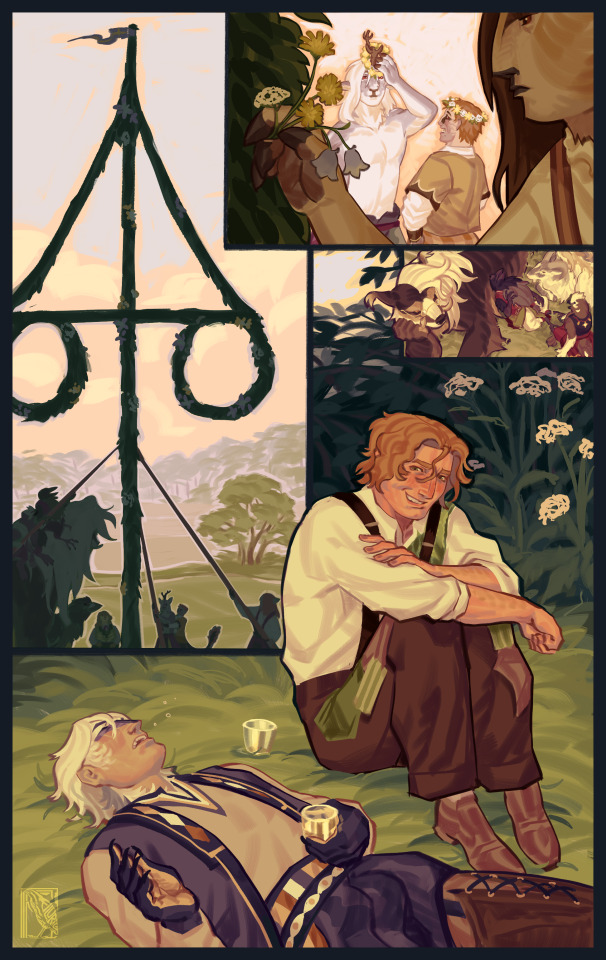
– this whole - the dancing, singing, pole...raising. it is all rather ridiculous... 'midsummer'. i fail to... see the point of this human... invention. for once.
arvo's words were slurred, uneven - as if merely letting them past his lips was a great effort... this was, no doubt, influenced by the drink in his hand, resting on his stomach. folke, who had, in fact, brewed the alcohol that they were drinking, giggled - not exactly sober himself.
– i'm... the only human here, arvo. remember...
– no kraksi, or crakam, in sartrill, raises a huge, leafy pole for long summer days, that much i know.
– okay, haha - the pole thing... the pole thing is entirely human, probably. but... gullmar - tomtar, celebrate 'solvarvir' around the same time... trolls celebrate, uh... oh, curses, i'll butcher it... 'rawr - owa'... rawrr - oh wra? rawr... haha!
arvo opened one of his eyes slowly, fighting against some kind of weight that has, somehow, been set upon them - in order to look at the human beside him, still struggling to pronounce the foreign word correctly. a corner of the basilisk's lips twitched upwards.
– hm. nevermind what i said. there is a certain element of entertainment present, i suppose...
#oc#original character#fantasy#midsummer#illustration#art#i would tag midsommar but. i know theres the movie so dont think thatll be very useful...#folklore#fantasy art#oc art#pareidolia tag#oc: folke#oc: arvo#oc: selma#oc: klint#oc: adrian#oc: ylvarg#oc: gullmar#oc: faství#frida and håkan are there too but theyre so small LOL#this is a bit late for a midsummer illustration but whatever#(one day late. LOL)#i kinda wanna mmake it a THing to draw a silly midsummer drawing every year. thing is#will there be a year where im 100% happy with the illustration afterwards. bcs im not satisfied with this but. WHATEVER#shoutout to anyone who remembers the drawing i did last year........#in universe btw some swedish holidays were definitely infuenced by the tomte/human connection#things like midsummer probably came to independently but their traditions got mixed once humans and tomtar began to intermingle a bit#trolls have their own summer celebrations but they tend to be less “1 day” and more like “several weeks” in length#also. this pic is a post story pic...#which is why arvo is actually expressing his befuddlement with human customs
306 notes
·
View notes
Text
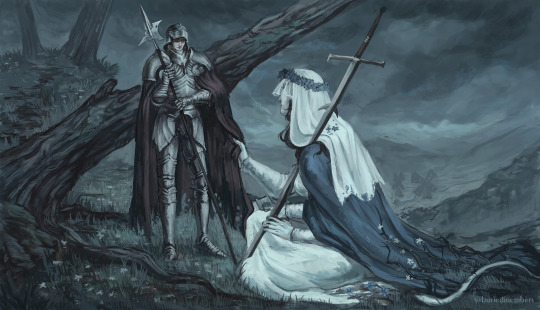
Herr Mannelig
#fantasy#fantasy art#medieval#herr mannelig#folklore#i love this ballad so much#and i've listened to so many covers#but haggard's one is still my very fav#yeah it is in italian not in swedish but it slaps#also another old art of mine i haven't shown here#my art
849 notes
·
View notes
Text




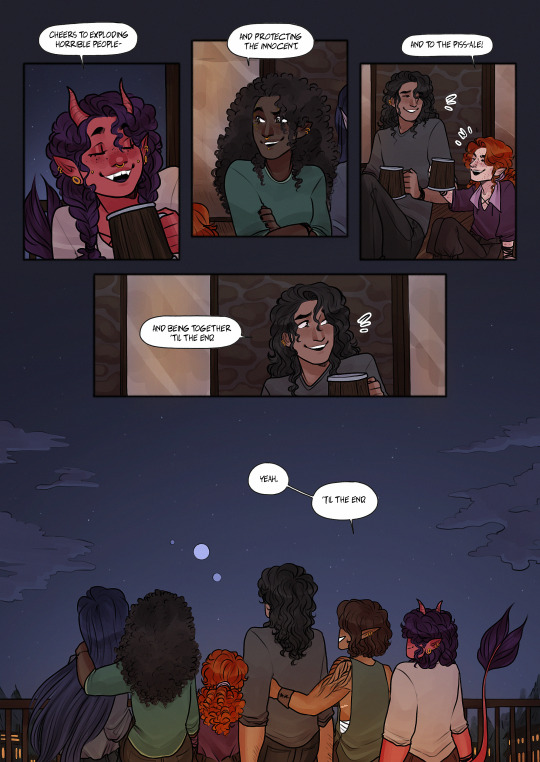
finally got out of my slump and finished the prologue!!
(psst i have this and other stuff on my webtoon)
#art#comic#fantasy#dnd#after party#tw blood#tw gore#i'm not saying what but there is. a very nasty bit of foreshadowing in this one#also i homebrewed goblins bc i hate dnd goblins with a passion#they're just lil. creachures. little guys#they're more like folklore pixies/goblins#pls reblog this took me a week
648 notes
·
View notes
Text



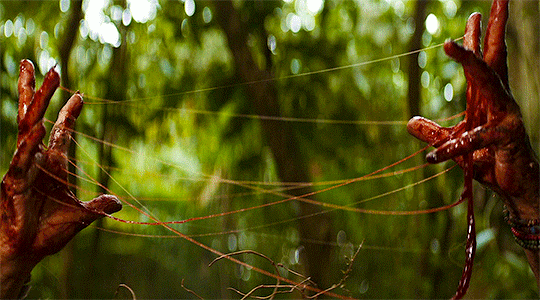

When you're part of the other side you see it everywhere. But I must travel on.
Satanic Hispanics (2022) dir. Alejandro Brugués, Mike Mendez, Gigi Saul Guerrero, Eduardo Sánchez, & Demián Rugna
#satanic hispanics#filmedit#horroredit#mygifs#they keep putting miss guerrero's very serious mexican folklore shorts in the middle of horror comedies#setting her up... free her#flashing
274 notes
·
View notes
Text
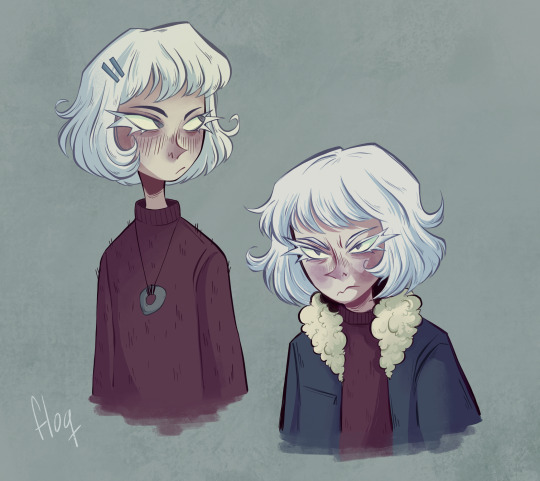
character redesign
experimenting on how to convey albinism in my art style
#you may recognize her as fuyumi#her name is violeta now#I’ve been in the process of relocalizing my story and characters#instead of basing it in the US I want to have my story take place on my country chile#most specifically in the chiloé archipelago#it’s a place in chile famous for its culture and folklore#and I think it tights very neatly with the story about witches and demons I want tell#like you gringos aren’t ready for the chiloé witchcraft lore#parasomnia#violeta eberhardt#oc#my ocs#my art
322 notes
·
View notes
Text
If you call yourself a Krishna Bhakt but at the same time disrespect the Mahishis (Queens) of Dwarka (this includes questioning the authenticity of their love for him and his love for them in return, comparing their love, putting them down, making abhorrent claims about how their love was not completely pure, claiming how they were jealous of each other and the gopis, making passive aggressive comments against them to even liking and sharing content which promote these kinds of beliefs) in the name of glorifying Kanha's leelas in Braj then it's beyond time for you to touch some grass, read actual scriptures and question your entire existence. *GLORIFICATION CAN BE DONE WITHOUT SHOWING DISRESPECT TO EITHER OF THE TWO GROUPS*
#*ignore the grammatical errors I was kinda angry while writing this*🙃#CLAIMING DWARKADISH AND HIS LEELAS IN DWARKA TO BE “INFERIOR” DOES NOT MAKE TO A GREAT DEVOTEE OF VRINDAVAN KRISHNA#*you#where do these people get the audacity from to go about claiming that Krishna married them out of obligation and to form political alliance#The hate for Mata Rukmini on the internet is actually insane after almost every major vishnu centric scripture glorifies her as Parashri#these people reach a new low every single time I come across them and the people who believe random folklores are even worse in my opinion#like before circulating a story or believing them blindly I am begging you guys to always cross check with scriptures#pls do more research and studying apart from that one random quora post you found#lot of the times translations are heavily manipulated made to fit their own biased opinions#when in doubt always refer original Sanskrit verses along with the context in which they are provided. I REPEAT CONTEXT IS VERY IMP#reading and cherry picking random verses without context will lead to nothing but delusion#hinduism#hindublr#krishna#gopiblr#devotion#krishnablr#kanha#desiblr#mahabharata
100 notes
·
View notes
Text


It is done and it is glorious!
This is a 1901 skirt for a promenade dress with added lace. I still have lace left over, so I may go back and add even more...
#the pattern is from marquise.de#link in post#image id in alt text#a talia original#talia's adventures in dressmaking#excerpts from my life#sewing progress#lace petticoat#historical costuming#this will go under my 1901 silk gown#but mostly it's for#historical underwear breakfast#i got the lace from some ladies on a folklore market who were very pleased with my excitement#finished project
179 notes
·
View notes